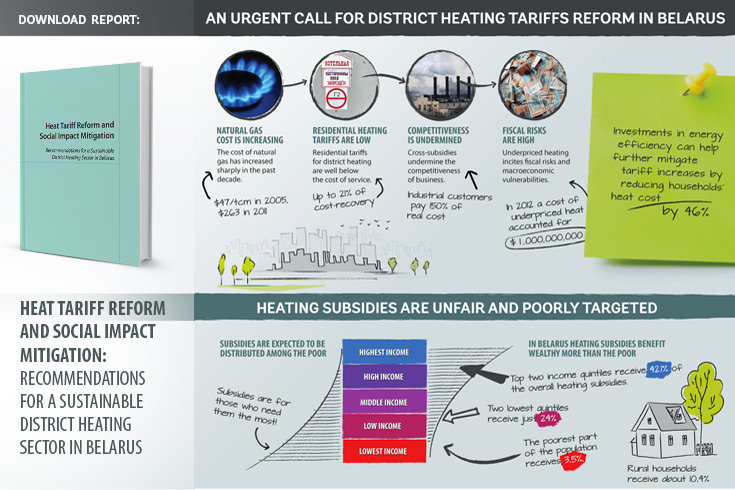|
|
|
|
||
|

Download the report or open the infographic.
National and energy sector programs outline specific investments and targets for the DH sector, such as increasing the use of biomass in heat generation, increasing cost-recovery levels, improving supply side energy efficiency, and restructuring the DH sector.
Why is tariff reform necessary?
Residential tariffs are well below the cost of service, and cross-subsidies are used to fill most of the gap between residential tariffs and actual cost, undermining the competitiveness of industries and increasing prices of consumer goods and services. Subsidies also create a growing fiscal burden, significantly increase fiscal risks and macroeconomic vulnerabilities, while being highly regressive and unfair to poor customers.
What is the likely impact of tariff reform?
The impact of tariff reform depends on how it is implemented. The financial burden on households, especially those who are poor, will increase both in rural and urban areas, and especially during the coldest times of the year when people are forced to cut spending on other essential goods. However, tariff increases will generate fiscal savings and boost utility revenues, while lower cross-subsidies will improve industry competitiveness.
How can tariff reform be implemented in the best possible way?
"The low gas prices, which are currently 2 times lower than in developed European countries, have not resulted in imbalances in the Belarusian economy. But if the prices are raised, these imbalances will emerge. Households pay less for heat owing to the fact that about USD 2 billion is compensated from the budget – higher tariffs for enterprises subsidize the low tariffs for households. If the gas prices are raised, enterprises and the budget would be unable to subsidize these costs, and the economic imbalances in the energy sector can increase time and time again..."
Source: Interfax.by article

"Thus, the recommendations of the World Bank that has prepared a study on tariff policy reforms in Belarus come to a few things. On the one hand, the Bank’s experts recommend moving away from the practice of cross-subsidization, thereby improving the competitiveness of enterprises. On the other hand, it is recommended to implement targeted social assistance mechanisms to support low-income citizens, for whom higher utility tariffs can become a heavy burden."
Source: Naviny.by article

“Oddly enough, when we raise the tariffs, we thereby, reduce the social injustice—on condition that targeted assistance is provided to the most vulnerable groups of the population. The thing is that the subsidies, which are currently provided to support the low tariffs, are used by the richest groups of the population as well. So, the greater their floor space is and the more resources they consume, the greater subsidy they benefit from.”
Alexander Chubrik, Director of the IPM Research Centre
Last Updated: Jul 30, 2014